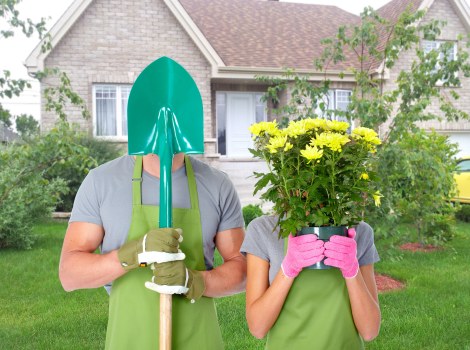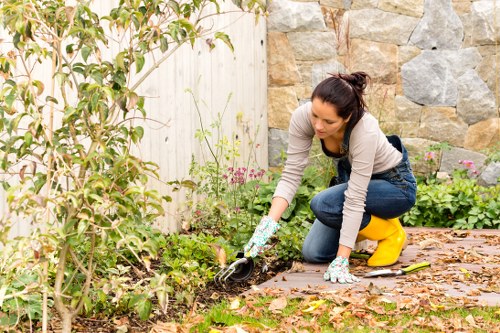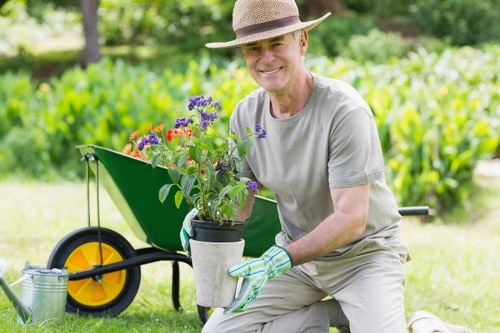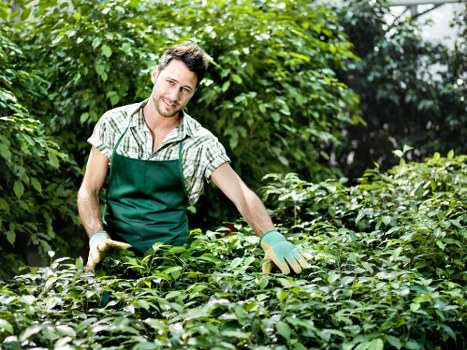Garden Maintenance in Kenton: Keeping Your Outdoor Space Pristine
Introduction to Garden Maintenance

Maintaining a beautiful garden in Kenton requires consistent effort and the right knowledge. Whether you're a seasoned gardener or a beginner, understanding the fundamentals of garden maintenance can transform your outdoor space into a lush, vibrant paradise.
Regular garden upkeep not only enhances the aesthetic appeal of your home but also promotes a healthy environment for your plants. In Kenton, the climate and soil conditions play a significant role in determining the best maintenance practices.
In this article, we'll explore essential garden maintenance tips tailored specifically for Kenton residents, ensuring your garden thrives year-round.
Understanding Kenton's Climate and Soil

Kenton experiences a temperate climate with distinct seasons, which influences plant growth cycles. Understanding the local climate is crucial for selecting the right plants and planning maintenance activities.
The soil in Kenton varies, but it is generally fertile, supporting a wide range of plant species. Conducting a soil test can help determine its pH level and nutrient content, allowing you to make necessary amendments for optimal plant health.
By tailoring your garden maintenance practices to suit Kenton's specific climate and soil conditions, you can ensure a thriving and resilient garden.
Essential Garden Maintenance Tasks

1. Regular Weeding
Weeds compete with your plants for nutrients, water, and sunlight. Regular weeding helps maintain the health and appearance of your garden.
2. Pruning and Trimming
Pruning promotes healthy growth and enhances the shape of your plants. It also helps in preventing diseases and pests.
3. Watering Properly
Proper watering techniques are vital. Overwatering can lead to root rot, while underwatering can stress your plants. Understanding the specific needs of each plant species is key.
4. Fertilizing
Fertilizers replenish the nutrients in the soil, supporting robust plant growth. Choose organic or synthetic fertilizers based on your garden's requirements.
5. Mulching
Mulching helps retain soil moisture, suppresses weeds, and regulates soil temperature. It also adds a polished look to your garden beds.
Seasonal Maintenance Tips

Different seasons demand different maintenance activities. Here’s a breakdown of essential tasks for each season in Kenton:
- Spring: Planting new seeds, pruning shrubs, and preparing garden beds.
- Summer: Regular watering, pest control, and harvesting ripe produce.
- Autumn: Clearing fallen leaves, planting perennials, and protecting plants from frost.
- Winter: Pruning dormant plants, planning for the next planting season, and protecting sensitive plants.
Adapting your garden maintenance routine to the changing seasons ensures continuous growth and beauty in your garden.
Choosing the Right Plants for Kenton

Native Plants
Native plants are well-suited to Kenton's climate and soil conditions. They require less maintenance and are more resistant to local pests and diseases.
Perennials vs. Annuals
Perennials return year after year, providing long-term stability to your garden. Annuals, on the other hand, need to be replanted each season but offer vibrant, seasonal color.
Vegetable and Herb Gardens
Growing your own vegetables and herbs can be highly rewarding. With proper maintenance, you can enjoy fresh produce throughout the growing season.
Shade and Sun Plants
Understanding the sunlight patterns in your garden helps in selecting plants that will thrive. Some plants prefer full sun, while others do better in shaded areas.
Flowering Plants
Flowering plants add color and fragrance to your garden. Selecting a variety of bloom times ensures continuous color throughout the year.
Tools and Equipment for Garden Maintenance
Essential Tools
- Trowel: Ideal for planting and transplanting.
- Pruning Shears: Perfect for trimming and shaping plants.
- Garden Fork: Useful for turning soil and aerating the ground.
- Watering Can: Essential for precise watering of plants.
- Lawn Mower: Keeps your lawn neat and even.
Maintenance Equipment
Investing in quality maintenance equipment can make your gardening tasks easier and more efficient. Regularly maintain your tools to ensure their longevity and effectiveness.
Safety Gear
Protect yourself while gardening by using gloves, protective eyewear, and appropriate footwear. Safety should always be a priority during garden maintenance.
Pest and Disease Management
Pests and diseases can significantly impact the health of your garden. Implementing integrated pest management (IPM) strategies can help control these issues sustainably.
- Regular Inspection: Frequently check your plants for signs of pests or diseases.
- Biological Controls: Introduce natural predators to manage pest populations.
- Cultural Practices: Maintain garden hygiene to prevent the spread of diseases.
- Chemical Controls: Use pesticides judiciously and opt for eco-friendly options whenever possible.
Effective pest and disease management ensures your garden remains healthy and vibrant.
Organic Solutions
Organic solutions are environmentally friendly and safe for beneficial insects and wildlife. Compost teas, neem oil, and insecticidal soaps are excellent options for organic pest control.
Preventive Measures
Preventing pests and diseases is more effective than treating them. Implementing preventive measures such as crop rotation, proper spacing, and selecting disease-resistant plant varieties can minimize issues.
Watering Strategies for a Healthy Garden
Proper watering is crucial for plant health. Overwatering can lead to root rot, while underwatering can stress plants and stunt growth.
- Understand Plant Needs: Different plants have varying water requirements. Research the specific needs of each plant in your garden.
- Watering Techniques: Water early in the morning or late in the evening to reduce evaporation and ensure maximum absorption.
- Deep Watering: Encourage deep root growth by watering thoroughly, allowing water to reach the root zone.
- Mulching: Apply mulch to retain soil moisture and reduce the frequency of watering.
- Use Drip Irrigation: Drip irrigation systems provide efficient and targeted watering, minimizing water waste.
Implementing effective watering strategies ensures your garden remains lush and healthy throughout all seasons.
Rainwater Harvesting
Collecting rainwater can be a sustainable way to water your garden. Install rain barrels to capture and store rainwater, reducing your reliance on municipal water supplies.
Lawn Care and Maintenance
A well-maintained lawn enhances the overall appearance of your garden. Proper lawn care involves mowing, aerating, fertilizing, and controlling weeds.
- Mowing: Regular mowing at the appropriate height promotes dense and healthy grass growth.
- Aeration: Aerate your lawn annually to improve soil structure and enhance root growth.
- Fertilizing: Apply the right type and amount of fertilizer to nourish your lawn.
- Weed Control: Implement strategies to prevent and eliminate weeds, ensuring a pristine lawn.
Consistent lawn care not only beautifies your garden but also contributes to a healthy outdoor ecosystem.
Choosing the Right Grass Type
Selecting a grass type suited to Kenton's climate ensures resilience and ease of maintenance. Consult with local garden centers to determine the best grass varieties for your lawn.
Hardscaping and Garden Structures
Incorporating hardscaping elements like paths, patios, and garden structures can enhance the functionality and aesthetics of your garden.
- Paths and Walkways: Create clear and attractive paths to navigate your garden easily.
- Patios and Seating Areas: Designate spaces for relaxation and socializing within your garden.
- Garden Structures: Install pergolas, trellises, or arbors to add vertical interest and support climbing plants.
- Fencing: Use fencing to define garden boundaries and provide privacy.
- Water Features: Incorporate fountains or ponds to add a soothing element to your garden.
Thoughtful hardscaping complements your garden maintenance efforts, creating a harmonious outdoor space.
Organic Gardening Practices
Adopting organic gardening practices promotes a healthy ecosystem and reduces environmental impact. Organic methods focus on sustainability and natural solutions.
- Composting: Recycle garden and kitchen waste into nutrient-rich compost to enhance soil fertility.
- Natural Pest Control: Use natural predators and organic pesticides to manage pests without harming beneficial insects.
- Crop Rotation: Rotate plant families to prevent soil depletion and reduce pest and disease buildup.
- Organic Fertilizers: Opt for organic fertilizers like manure, bone meal, and fish emulsion to nourish your plants.
- Conservation Tillage: Minimize soil disturbance to maintain soil structure and health.
Implementing organic practices ensures a sustainable and eco-friendly garden that thrives naturally.
Dealing with Common Garden Problems
Diseases
Common garden diseases in Kenton include powdery mildew, rust, and blight. Identifying symptoms early and applying appropriate treatments can prevent widespread damage.
Pests
Pests such as aphids, slugs, and caterpillars can wreak havoc on your garden. Employing a combination of physical barriers, natural predators, and organic treatments can effectively control pest populations.
Weeds
Persistent weeds can overtake your garden beds, competing with your plants for resources. Regular weeding and the use of mulches can help keep weeds at bay.
Improper Planting
Incorrect planting depth, spacing, or timing can lead to poor plant growth. Ensure you follow best practices for planting to promote healthy and vigorous plants.
Soil Erosion
Soil erosion can strip away valuable topsoil, impacting plant health. Implementing erosion control measures such as ground covers and retaining walls can protect your garden.
Enhancing Garden Aesthetics
Creating a visually appealing garden involves more than just plant maintenance. Aesthetic enhancements can elevate the overall beauty of your outdoor space.
- Color Coordination: Choose plants with complementary colors to create a harmonious palette.
- Texture and Form: Incorporate a variety of plant textures and forms to add depth and interest.
- Garden Art: Add sculptures, ornaments, or decorative elements to personalize your garden.
- Lighting: Use garden lighting to highlight key features and extend enjoyment into the evening.
- Water Features: Install fountains or ponds to introduce movement and tranquility.
Thoughtful aesthetic choices can transform your garden into a stunning and inviting retreat.
Seasonal Flower Displays
Planting seasonal flowers ensures continuous color and interest throughout the year. Plan your flower beds to include blooming plants in different seasons.
Sustainable Garden Practices
Embracing sustainability in your garden maintenance efforts contributes to environmental preservation and resource conservation.
- Water Conservation: Implement rainwater harvesting, drip irrigation, and mulching to reduce water usage.
- Energy Efficiency: Use solar-powered garden lights and energy-efficient tools to minimize energy consumption.
- Recycling and Upcycling: Repurpose materials for garden projects, reducing waste and promoting creativity.
- Biodiversity: Encourage a diverse range of plants to support local wildlife and beneficial insects.
- Composting: Turn organic waste into valuable compost to enhance soil health naturally.
Sustainable practices not only benefit the environment but also create a resilient and thriving garden ecosystem.
Hiring Professional Garden Maintenance Services
While DIY garden maintenance is rewarding, professional services can offer expertise and efficiency, especially for larger or more complex gardens.
- Expert Knowledge: Professionals possess in-depth knowledge of plant care, pest management, and landscape design.
- Time-Saving: Hiring experts allows you to enjoy a beautiful garden without the time commitment of maintenance tasks.
- Customized Services: Professional services can tailor maintenance plans to your garden's specific needs.
- Quality Results: Experienced gardeners ensure high-quality maintenance, enhancing the overall health and appearance of your garden.
- Stress Reduction: Outsourcing maintenance tasks reduces the stress associated with garden upkeep.
Consider hiring professional garden maintenance services in Kenton to maintain your garden's beauty and health effortlessly.
Choosing the Right Service Provider
When selecting a garden maintenance service, consider factors such as experience, reputation, range of services, and pricing. Reading reviews and seeking recommendations can help you make an informed decision.
Conclusion: Achieving a Beautiful Garden in Kenton
Maintaining a garden in Kenton is a fulfilling endeavor that requires dedication, knowledge, and the right practices. By understanding the local climate, performing essential maintenance tasks, and adopting sustainable gardening methods, you can cultivate a garden that thrives year-round.
Whether you choose to maintain your garden yourself or enlist professional services, the key to success lies in consistent care and a passion for gardening.
Ready to transform your garden? Contact us today to book your garden maintenance service and enjoy a beautiful outdoor space all year long!

